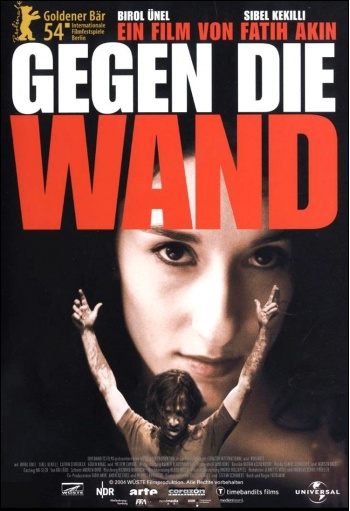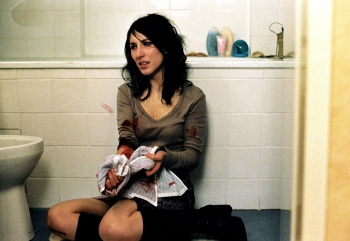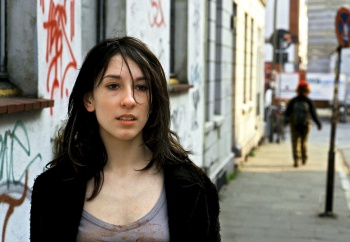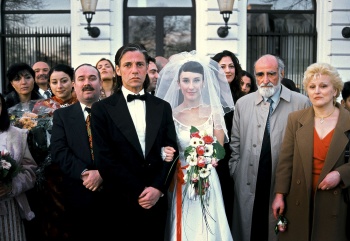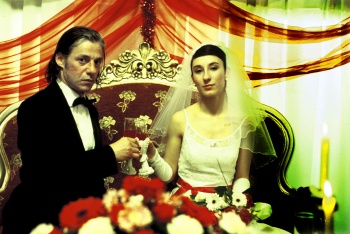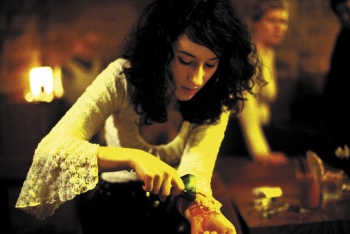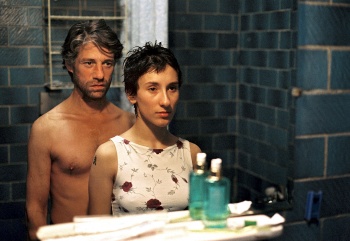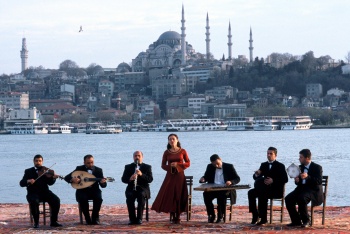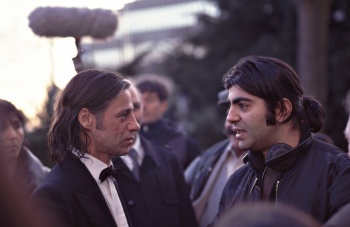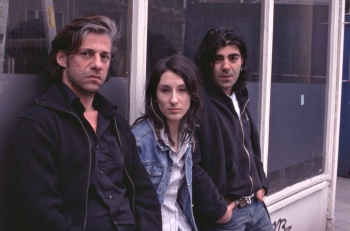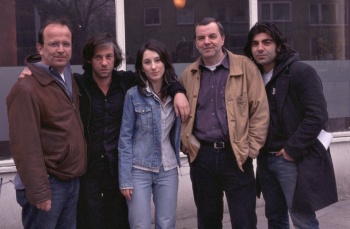"Sie können Ihrem Leben auch ein Ende setzen, ohne sich umzubringen", flüstert der Arzt. Und Cahit, 40, der wegen eines Selbstmordversuchs in der geschlossenen Abteilung eines Krankenhauses liegt, weiß genau, was er damit meint: Er muss ein neues Leben beginnen. Auch wenn die Wut, die immer noch tief in seiner Seele sitzt, weiter danach schreit, mit Alkohol und Drogen betäubt zu werden. Sibel - 20, schön, und wie Cahit türkischer Herkunft, aber in Hamburg aufgewachsen - liebt das Leben zu sehr, um eine anständige Muslimin zu sein. Um aus dem Gefängnis auszubrechen, das ihre streng gläubige und traditionsbewusste Familie um sie herum aufbaut, versucht sie, sich umzubringen. Doch sie überlebt. Ihre einzige Chance, der Familie zu entfliehen, sieht Sibel darin, Cahit zu bitten, sie zu heiraten. Nach kurzem Zögern stimmt er zu. Vielleicht weil er weiß, dass er dadurch auch sich selbst retten kann. Vielleicht aber auch nur, um zumindest einmal in seinem Leben etwas Sinnvolles zu tun. So teilen sich die beiden eine Wohnung, doch kaum mehr.
Sibel kostet ihre neu gewonnene Freiheit voll aus, Cahit geht weiterhin mit seiner flüchtigen Bekanntschaft Maren ins Bett. Bis sich die Liebe langsam in sein Leben einschleicht. Er verliebt sich in Sibel - und findet wieder Freude am Leben, Kraft weiter zu machen. Sibel trifft sich weiterhin mit anderen Männern - bis sie merkt, dass auch sie sich in Cahit verliebt hat. Doch zu spät: Seine Eifersucht führt zum gewaltsamen Tod eines ihrer Liebhaber. Nachdem Cahit verhaftet worden ist und Sibel von ihrer Familie verstoßen wird, flieht sie nach Istanbul. Dort findet Cahit sie nach seiner Entlassung aus dem Gefängnis. Noch immer hofft er auf eine gemeinsame Zukunft ... (Katalog Berlinale 2004)
Head On
"You know, you can put an end to your life without committing suicide”, the doctor whispers into forty-year-old Cahit’s ear. Cahit, who is recovering from a suicide attempt in a special hospital ward, knows exactly what he means. Even if he still longs to numb the anger deep inside him with drugs and alcohol. Sibel is a beautiful twenty-year-old who, like Cahit, is of Turkish extraction. She loves life far too much to behave like a decent Muslim. Her own suicide attempt was a bid to escape the prison that her very devout, traditional parents have built around her. She has survived, only to discover that her action has by no means paved the way for the freedom she so desires. As Sibel sees it, her only chance to escape her family now is to ask Cahit to marry her. After some initial hesitation, Cahit agrees - perhaps because he realises that this is a way of saving himself. But it may just be because, for once in his life, he’d like to do something useful. Before long, the pair are sharing an apartment - and very little else.
Sibel relishes every moment of her new-found freedom. Cahit, however, continues to go to bed with his sometime lover, Maren. But then, gradually, love begins to creep into his life.Cahit falls in love with Sibel; in time, he even starts to enjoy life again, finding the strength he needs to go on. Although Sibel continues to see other men, she too discovers that she has fallen in love with Cahit. However, her realisation comes too late: in a fit of jealous rage Cahit kills one of her lovers. Cahit is arrested. Disowned by her family, Sibel escapes to Istanbul where she meets Cahit on his release from prison. Apparently, he still believes that they have a future together... (Berlin Film Festival Catalogue 2004)
Buch, Regie: Fatih Akin
Produktion: Wüste Filmproduktion in Co-Produktion mit NDR/ARTE und Corazón International, Hamburg
Produzenten: Stefan Schubert, Ralph Schwingel
Co-Produzenten: Fatih Akin, Andreas Thiel, Mehmet Kurtulus
Produktionsleitung: Ingrid Holzapfel
Aufnahmeleitung: Jan Weber
Regieassistenz, künstlerische Mitarbeit: Andreas Thiel
Kamera: Rainer Klausmann
Kameraassistenz: Hervé Dieu
Schnitt: Andrew Bird
Schnittassistenz: Nikolai Hartmann
Ton: Kai Lüde
Tonassistenz: Herbert Wüst
Mischung: Richard Borowski
Musikberatung: Klaus Maeck
Szenenbild: Tamo Kunz
Requisite: Beate ter Schüren, Christoph Birth
Kostüm: Katrin Aschendorf
Maske: Daniel Schröder, Nursen Balci
Kampfchoreografie: Emanuel Bettencourt
Casting: Mai Seck
Darsteller: Birol Ünel, Sibel Kekilli, Catrin Striebeck, Güven Kirak, Meltem Cumbul, Cem Akin, Hermann Lause, Cem Akin u.a.
Redaktion: Jeanette Würl, NDR; Andreas Schreitmüller, ARTE
Fotos: © WÜSTE Film / Kerstin Stelter
Fatih Akin *1973 in Hamburg als Sohn türkischer Eltern; seit 1993 Zusammenarbeit mit der WÜSTE Filmproduktion, Hamburg; 1994-2000 Studium Visuelle Kommunikation Hamburger Hochschule für bildende Künste (HfbK); 1998 Spielfilmdebüt; 2003 Gründung der Filmproduktion Corazón International; Autor, Regisseur und Produzent, gelegentlich auch Schauspieler; lebt in Hamburg
Fatih Akin *1973 in Hamburg as a son to Turkish parents; since 1993: co-worker with the WÜSTE film production company, Hamburg; 1994-2000: studied Visual Communication at the Hamburg College of Fine Arts (HfbK); debut as a feature film director in 1998; founded the film production company Corazón International in 2003; scriptwriter, director and producer, occasionally also actor; lives in Hamburg
Drehorte: Hamburg, Istanbul
Drehzeit: 10.03.2003 - 02.05.2003
Erstaufführung: 12.02.2004, Internationale Filmfestspiele Berlin (Wettbewerb)
Kinostart: 11.03.2004, timebandits films
Erstausstrahlung: 23.10.2006, ARTE
Förderung: nordmedia Fonds GmbH in Niedersachsen und Bremen (Produktion); Filmförderung Hamburg; FFA; BKM
Information:
WÜSTE Filmproduktion
Schulterblatt 58
20357 Hamburg
E-Mail: wueste@wuestefilm.de
www.wuestefilm.de
Verleih/distribution:
timebandits films
E-Mail: office@timebandits-films.de
www.timebandits-films.de
Weltvertrieb/international sales:
Bavaria Film International
www.bavaria-film-international.de
Preise:
- Goldener Bär, 54. Internationale Filmfestspiele Berlin 2004
- Deutscher Filmpreis 2004in Gold als bester Spielfilm, für die beste Regie (Fatih Akin), die beste Hauptdarstellerin (Sibel Kekilli) und den besten Hauptdarsteller (Birol Ünel) sowie Filmpreis in Gold für Rainer Klausmann (Kamera)
- Gilde Filmpreis in Gold als bester deutscher Spielfilm 2003/2004, Filmmesse Leipzig 2004
- Bambi 2004 in der Kategorie "Shooting Star" für Sibel Kekilli;
- Publikumspreis, Festival de Cine in Sevilla 2004
- "Der vergoldete Schnitt 2004", Schnitt Preis der Filmstiftung NRW in der Kategorie Spielfilm an Andrew Bird
- Europäischer Filmpreis 2004 als bester europäischer Film des Jahres und Europäischer Publikumspreis als bester Regisseur, Barcelona 2004
- "Goya"-Preis der spanischen Filmakademie als bester europäischer Film, Madrid 2005
- Preis für die beste Schauspielerin an Sibel Kekilli, Santa Barbara International Film Festival 2005 (USA)
- Awards für das beste Drehbuch und die beste Hauptdarstellerin, Zimbabwe International Filmfestival 2005
- Preis für den besten ausländischen Film, 40. NSFC-Awards (NATIONAL SOCIETY OF FILM CRITICS AWARDS) 2006, USA

